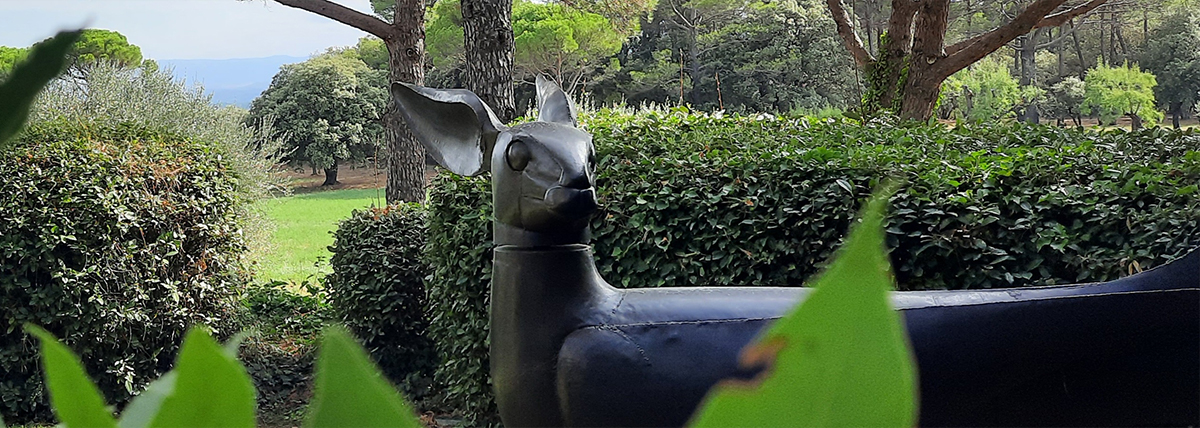
October 2022
AGENDA
Seminars
The neural crest perspective on craniofacial development – Philippe Soriano.
The neural crest is a population of embryonic stem cells that arises in the developing central nervous system. Neural crest cells then undergo a mesenchymal epithelial transition to become migratory cells that undertake some of the longest migrations of any embryonic cell type. These cells differentiate into a wide range of derivatives, including much of the head skeleton. Here, we propose to bring together a group of researchers to address the important question of how a single population of embryonic cells can form many and diverse cell types. The proposed seminar extends previous gatherings at Les Treilles focused on neural crest cells, but focuses more on the interplay between what is known about early neural crest development and how this translates into the events that lead to the formation of craniofacial structures. We anticipate that this seminar will provide valuable insight into how errors that occur in the early stages of development can affect the correct formation of facial structures and lead to human birth defects.
The Voice Academy
Opera in the 20th and 21st centuries – Ivan Alexandre, Julien Benhamou, Alain Perroux.
In recent years the repertoire has not only expanded to Baroque circles. The 20th century emerges from the shadows. Titles still scattered in the 1970s are today the beautiful evenings of New York, Milan, Paris, finally everywhere. And the 21st century is also progressing, especially in the USA where the most performed living composer on our planet, Philip Glass, resides. In France, the 19th century ends with Louise (1900); the 20th century begins with Pelléas et Mélisande (1902) then discovers Ravel, Messager, Poulenc, Messiaen, “classics” today. It is to all of them that the sixth Academy of the Voice will be dedicated under the guidance of our guest teacher Dame Felicity Palmer, monumental Leokadja in Mahagonny, unforgettable Klytemnestra in Elektra, incomparable prioress in Poulenc’s Dialogues and creator of Abbess Josefa in Love and Other Demons by Péter Eötvös. [learn more]
Residential studies
Philosophical reflections of mathematicians and mathematical advances: the case of Poncelet – Karine Chemla & Bruno Belhost.
The project of this residential study is to write a biographical work on Jean-Victor Poncelet (1788-1867). One of the key innovations that Poncelet introduced in geometry is the notion of ideal element. This notion – which he explicitly distinguishes from the notion of imaginary element – is intimately linked to one of the principles under the aegis of which Poncelet places projective geometry: the principle of continuity. Our thesis is that this principle had a much greater impact on nineteenth-century mathematics—and modern mathematics in general—than the projection principle, which historians usually emphasize. Kant’s philosophy also interested several mathematicians in France at the time. This project therefore has a double challenge. It will first be a question of determining the nature of the impact of the philosopher Kant on mathematicians, and of underlining the major role of the philosophical activity of mathematicians on the mathematical innovations that they introduce. It seems important to us to highlight that, in the past, philosophical reflection was not an extra soul for the mathematician, but that it often played an essential role for the very advancement of mathematics.
Residencies
Author’s residency : François Henri-Désérable
His project : travelogue in Latin America, in the footsteps of Che Guevara.
“It was from Córdoba, in Argentina, a day’s drive northwest of Buenos Aires, that twenty-nine-year-old Alberto Granado, known as Mial, left on December 29, 1951, and his friend Ernesto Guevara, known as Fuser, twenty-three years old The route: Argentina – Chile – Peru – Colombia – Venezuela The means of transport: a Norton 500cc 1939 baptized Poderosa II, which means “La Vigoreuse” – and which had no only the name. The objective: to see the country. From this trip, Guevara and Granado had each drawn a story. From these stories, Walter Salles had drawn a film. Film and stories – in addition to a romantic passion for Che – made me want to follow in their footsteps for 8,000 kilometers on a motorbike, car, bus or truck. The route was mapped out; all I had to do was follow it. One morning, six months later, I was back. It is this trip through Latin America, in the footsteps of the man who would become Che, that I would like to tell .” [learn more].
Photography Residency : Alain Fleischer
His project : Photographic interpretation of Ovid’s “Metamorphoses”.
Through processes and techniques specific to photography, with its ability to transform reality through the manipulation of light and its imprint, thanks to shots both in natural settings and in the studio, it will be to produce a series of images inspired by the long Latin poem. The photographs will be made using a mixture of techniques, with the presence of characters. The results will result in large-format color prints, forming an aesthetically and thematically homogeneous series. [find out more].
The Musical Composition Prize
A patron of the arts and sciences, Anne Gruner Schlumberger has supported contemporary composers. In order to continue to encourage musical creation, the Fondation des Treilles is creating a composition residency prize whose purpose is to support the creation of a musical work for the concert, the stage or an audiovisual work. [find out more]
If you wish to apply for the 2024 season you can access the online form here.
Call for applications
Application deadlines :
– The Young Researcher Prize (for 2023) : September 1 – October 30, 2022
– The Author’s Residency Prize (for 2024) : October 1, 2022 – January 31, 2023
– The Musical Composition Prize (for 2024) : October 1, 2022 – December 31, 2022
The Treilles research blog
Genealogies, filiations, relationships of gods and men in Homer and in the archaic Greek world – Adeline Grand-Clément, Corinne Bonnet and Gabriella Pironti
The international workshop “The Gods of Homer” brought together a group of specialists in ancient Greece, from both a historical and anthropological perspective. The team is made up of around fifteen European researchers who work on Homer’s gods from an interdisciplinary perspective combining philology, history, anthropology, art history and the comparative history of religions. She wanted to explore the founding and structuring role of discourses (texts and images) on divine filiations. The objective was to analyze the multiple issues related to kinship relationships that are tied in the poetic or iconographic fabric, as well as in the various contexts of reception of the Homeric poems and, more generally, of archaic Greek poetry. A collective work will complete the series of 3 volumes “The Gods of Homer” published to date. [find out more]
![]() Watch the video presentation of the seminar by Corinne Bonnet and Gabrielle Prionti on our Youtube channel.
Watch the video presentation of the seminar by Corinne Bonnet and Gabrielle Prionti on our Youtube channel.
